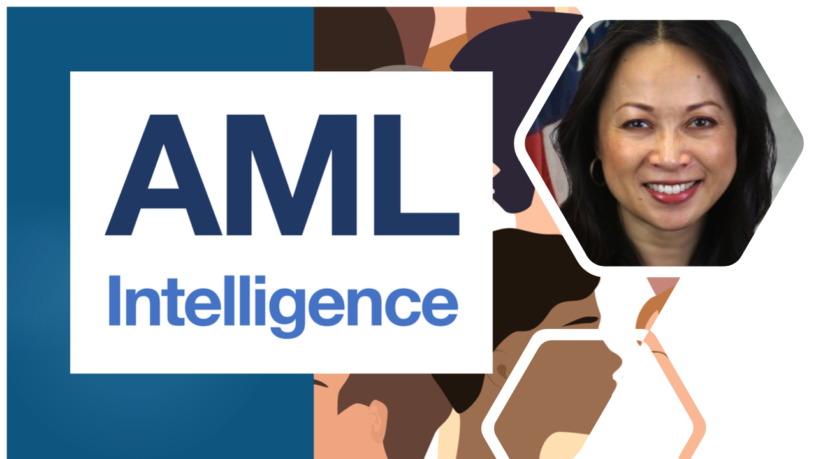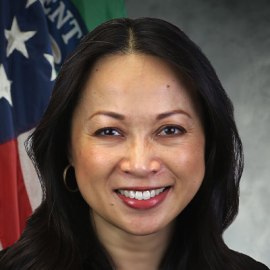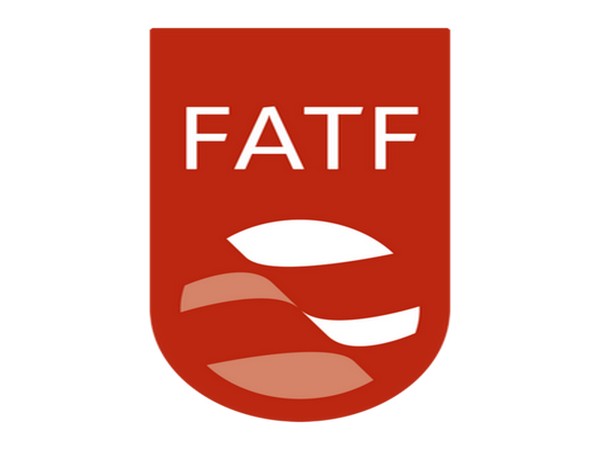It’s an honor to be invited to Women in FinCrime and to join so many amazing women leaders and trailblazers. I personally and professionally appreciate the opportunity to share some thoughts with you about FinCEN’s ongoing work, the impressive women leaders I work with at FinCEN, and the intersection of that work with addressing gender discrimination and parity around the globe.
To give you a little background about myself, I joined FinCEN after spending over 15 years with the United States Department of Justice. I was a Federal prosecutor for DOJ in both San Diego and Washington, D.C., and I served overseas tours for DOJ in Serbia and Panama working on anti-corruption and anti-money laundering efforts.
My last position at DOJ was as the head of the unit, the Public Integrity Section, overseeing DOJ’s public corruption and election crime cases nationwide. I have had the luxury of a mission to believe in during my entire career in government.
FinCEN has been no exception. The United States Congress passed the Anti-Money Laundering Act in January 2021.
The AML Act is a landmark piece of legislation that will bolster the United States’ national security and help better protect our communities and people.
It represents the greatest transformation of the United States’ AML-CFT regime since the USA PATRIOT Act of 2001. For FinCEN, this is a remarkable time in FinCEN’s history, as the AML Act has endowed us with a leading role in strengthening our AML-CFT architecture.
The responsibilities of implementing this sweeping legislation include:
- Establishing national AML-CFT priorities, issuing regulations to implement those priorities, and ensuring enforcement of and compliance with the new requirements;
- Establishing an annual Bank Secrecy Act training program for all Federal examiners in the United States;
- Enhancing whistleblower provisions to provide for a robust whistleblower program and new anti-retaliation protections;
- Establishing an Office of Domestic Liaison, with regionally based domestic liaisons to serve as an interface between private industry and regulators located across the United States;
- Establishing a network of foreign financial intelligence liaisons located overseas;
- Reviewing, and revising as appropriate, Currency Transaction Report and Suspicious Activity Report (SAR) requirements;
- Expanding BSA requirements and obligations to persons engaged in the trade of antiquities;
- Hosting a Financial Crimes Tech Symposium, enhancing the FinCEN Exchange, and establishing two new subcommittees in the areas of innovation and technology as well as information security within our flagship public-private partnership, the Bank Secrecy Act Advisory Group;
- Working on feedback regarding BSA data, to include improved law enforcement reporting to FinCEN and improved feedback between FinCEN and financial institutions on the usefulness of SARs;
- Formalizing a pilot program to allow financial institutions to share SARs with their foreign branches, subsidiaries, and affiliates; and
- Conducting a formal review of regulations and guidance implementing the BSA.
The women and men of FinCEN have been working nonstop since last year to implement all of these requirements. Some of the key deliverables to date include: the publication of the national AML-CFT Priorities last June, an advance notice of proposed rulemaking regarding antiquities last September, a proposed rulemaking regarding SAR sharing pilots in January of this year, and a request for information regarding ways to streamline, modernize, and update the AML-CFT regime in December.
And now, because International Women’s Day is on Tuesday, and March is Women’s History Month for many of us, and because this is, after all, Women in FinCrime, I’d like to say something about my colleagues – the amazing FinCEN women who are leading or helping to lead these transformational efforts. During any given year, FinCEN is 50% women.
We have women leaders, and in some cases all female management teams, throughout the bureau, and in some of our divisions, such as our Policy Division, our Technology Division, and our Chief Counsel’s office.
That means that women oversee the breadth of our regulatory work, they maintain our information technology and drive the building of new tools and systems, and they provide us with critical legal contours and advice.
We have women leaders heading up our digital currency work, our special data analytics projects, our international engagements, including our longstanding participation with The Egmont Group, and our digital identity initiatives. Women lead our offices that partner with and train our thousands of federal and state law enforcement colleagues who use BSA data to conduct their criminal investigations, and they lead our offices that oversee the entire range of our enforcement actions and authorities.
We have women leaders directing our fight against ransomware, leading our counter-terrorism intelligence analysis, and running our operational work across a wide range of European and other partners. Women lead our media and communications engagements, our diversity and inclusion programs, and our legislative efforts. Eighty-six percent of the employees in our front office, where I sit, are women.
I am truly proud of all of the work that FinCEN’s entire workforce has accomplished and is doing right now, and I am also really excited to be working alongside such impressive women every single day.
But it is not lost on any of us that vast numbers of women around the world will never have these opportunities to contribute, to make a difference, and to participate fully in society.
There is a particular stream of FinCrime that I would like to highlight that intersects meaningfully and impactfully with women’s equality, particularly that of vulnerable women, and that is anti-corruption.
Corruption has the unique ability to worsen the worst of circumstances. Not only is corruption corrosive to democratic institutions and trust in those institutions, corruption also preys on the vulnerable, the poor, and the powerless.
According to the United Nations Office on Drugs and Crime, it is suspected that corruption can affect women, as a more vulnerable group, more adversely than men. This is likely more prominent when women are disempowered relative to men, with limited avenues of response and limited ability to resist the pressures of bribery or more terrible forms of victimization.
Corrupt criminal justice institutions can render women unable to report cases of bribery or seek help for victimization. Corrupt political systems can perpetuate gender inequalities and discrimination. Corruption can all too easily increase barriers and the costs of access to basic goods and services, such as food, medical care, clothes, housing, and education.
I know that everyone here recognizes that anti-corruption and anti-bribery efforts are a critical component of FinCrime. Our Treasury Secretary, Janet Yellen, remarked last December that “Corruption, after all, is just a form of financial alchemy. It’s the transformation of power into illicit money or illicit money into power, and in order to catalyze that transformation, bad actors usually need an intermediary, a place to store or launder their ill-gotten gains: a shell company, a real estate transaction, an art purchase.”
This concept of financial alchemy is what brings me to a critical component of FinCEN’s ongoing anti-corruption work.
We are in the process of implementing the Corporate Transparency Act, which was passed as part of the AML Act in January 2021.
The CTA allows FinCEN to build a national beneficial ownership information database, and last December, FinCEN issued a proposed rule to collect the necessary information that will help us build this database. It will require many U.S. and foreign companies to report their true beneficial owners to FinCEN and to update that information when those beneficial owners change.
The next step in the CTA rulemaking series will be FinCEN’s publication of proposed rules on beneficial ownership information access and disclosure requirements. We’re also ensuring similar transparency with real estate. Also last December, FinCEN published an advance notice of proposed rulemaking seeking public input on a proposal to address the vulnerability of the U.S. real estate market to money laundering and other illicit activity.
Ultimately, we intend for these efforts to shine a spotlight on the financial shadows in America that give corruption cover, exposing those who steal, launder, and by their theft deprive women, children, and citizens around the world of funding for basic needs such as education, healthcare, roads, and food.
International Women’s Day is on Tuesday, and the theme for 2022 is #BreaktheBias.
I challenge all of us here to take a meaningful step towards accelerating women’s equality, not just in our societies, but around the world, whatever that action might be for you.
It might be advancing anti-corruption initiatives, building a workplace where women thrive, elevating the visibility of women, or forging women’s equality and empowerment. Whatever your contribution, I know and believe that the collective strength of all of our efforts will contribute to a fair and just society for women and for all.
Share this on:
Follow us on:









